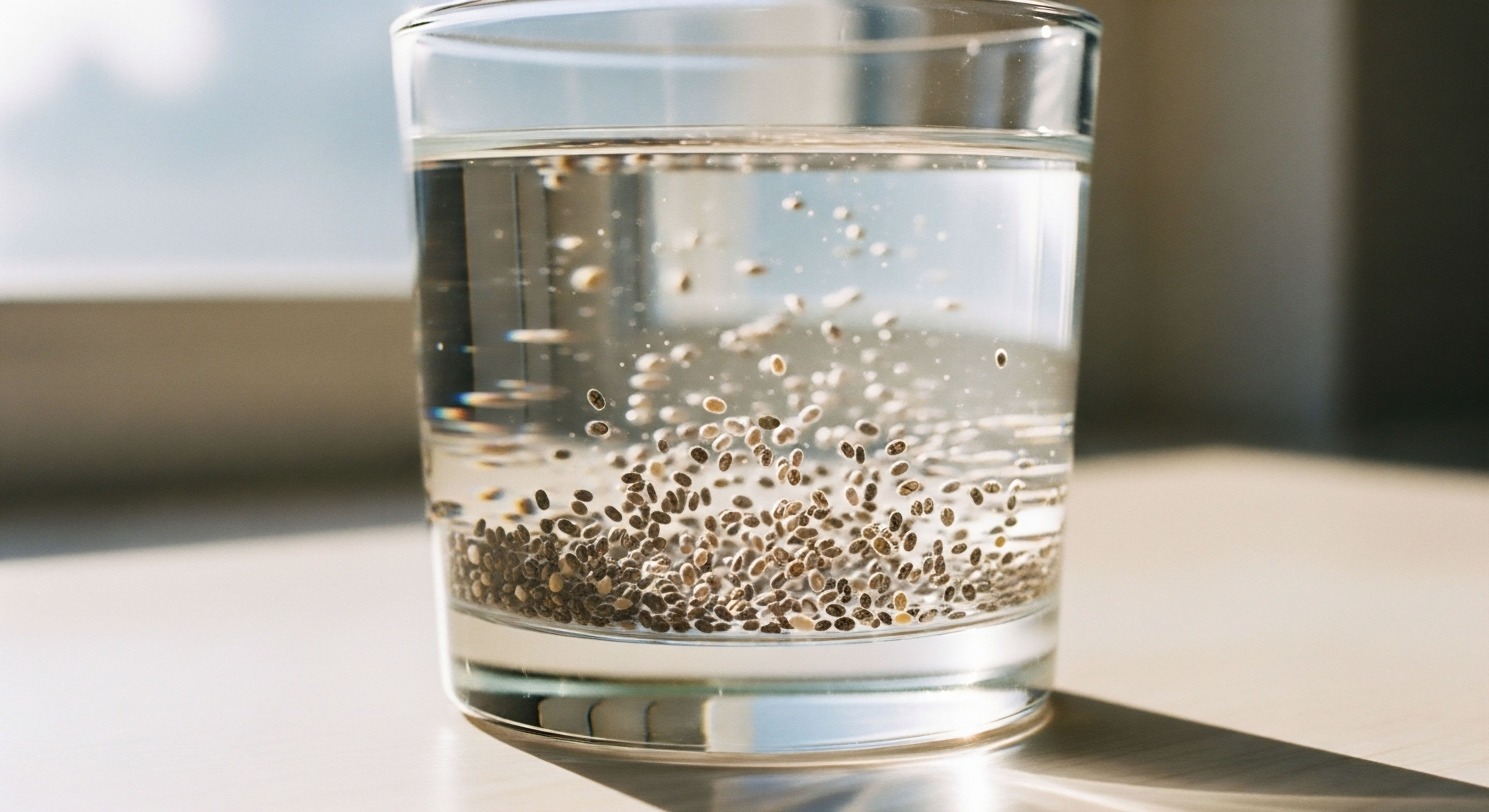

Fundamentals

Understanding the Foundation of Peptide Therapy
Peptide therapy represents a significant advancement in personalized health, utilizing short chains of amino acids to signal specific cellular actions. These peptides are essentially messengers, instructing your body to perform functions like enhancing tissue repair, modulating inflammation, or optimizing hormone production. The success of this therapy is deeply intertwined with your daily habits.
Lifestyle choices create the physiological environment in which these peptides operate. A supportive lifestyle can amplify their effects, while a detrimental one can hinder their efficacy. Think of your body as a garden; peptide therapy plants the seeds of positive change, but the quality of the soil ∞ your overall health and lifestyle ∞ determines how well those seeds will grow.
For those new to this treatment, it is beneficial to understand that peptides are not a magic bullet. They are a tool to help your body function more efficiently. To get the most out of your investment in peptide therapy, it is important to focus on the foundational pillars of health.
These include a nutritious diet, regular physical activity, restorative sleep, and effective stress management. Each of these elements plays a direct role in how your body responds to the peptides, influencing everything from absorption and utilization to the ultimate therapeutic outcome. By addressing these lifestyle factors, you are not just supporting your peptide therapy; you are actively participating in your own health and well-being, creating a synergistic effect that can lead to more profound and lasting results.

The Core Four Lifestyle Factors for Success
To maximize the benefits of peptide therapy, a focus on four key areas of your lifestyle is paramount. These are the cornerstones upon which a successful treatment plan is built. Without attention to these fundamentals, the full potential of peptide therapy may not be realized.
- Nutrition A well-balanced diet provides the essential building blocks your body needs to respond to peptide signals. Proper nutrition supports cellular repair, hormone production, and overall metabolic function.
- Exercise Regular physical activity enhances circulation, improves insulin sensitivity, and stimulates the release of your body’s own growth factors, all of which can work in concert with peptide therapies.
- Sleep Deep, restorative sleep is when your body undergoes its most critical repair and regeneration processes. Many peptides, particularly those that support growth hormone release, are most effective during this time.
- Stress Management Chronic stress can lead to hormonal imbalances and inflammation, creating a physiological environment that can counteract the intended effects of peptide therapy.

How Diet Directly Impacts Peptide Efficacy
The food you eat provides the raw materials for every process in your body, including the synthesis and function of peptides. A diet rich in high-quality protein is particularly important, as amino acids are the fundamental components of peptides.
Consuming adequate protein ensures that your body has a sufficient supply of these building blocks to support both its natural peptide production and the action of therapeutic peptides. Lean meats, fish, eggs, and legumes are excellent sources of protein to include in your diet.
In addition to protein, a diet abundant in fruits, vegetables, and healthy fats can help to reduce inflammation and support overall cellular health. Chronic inflammation can interfere with cellular signaling and may diminish the effectiveness of peptide therapy. By choosing whole, unprocessed foods, you create an internal environment that is more receptive to the therapeutic signals of peptides.
Proper hydration is also a key factor, as water is essential for transporting peptides throughout the body and for all metabolic processes. Aim to drink plenty of water throughout the day to ensure your body is functioning optimally.
A nutrient-dense diet is not just a recommendation but a prerequisite for maximizing the benefits of peptide therapy.

The Synergistic Role of Physical Activity
Exercise is a powerful modulator of your body’s physiology, and its effects can be highly synergistic with peptide therapy. Regular physical activity, particularly resistance training, can increase your body’s sensitivity to certain peptides, meaning that your cells become more responsive to their signals.
This is especially true for peptides that are involved in muscle growth and repair. When you engage in strength training, you create microscopic tears in your muscle fibers, and peptides can then signal the body to repair and rebuild those fibers stronger than before.
Cardiovascular exercise also plays a supportive role by improving blood flow and circulation. This enhanced circulation ensures that the peptides you administer are efficiently transported to their target tissues throughout the body. Furthermore, exercise can help to regulate blood sugar levels and improve metabolic health, which is beneficial for a wide range of peptide therapies, including those aimed at weight management and metabolic optimization.
The key is to find a consistent exercise routine that you enjoy and that aligns with your health goals and the specific peptides you are using.

Why Sleep and Stress Are Non-Negotiable
The importance of sleep and stress management in the context of peptide therapy cannot be overstated. During the deep stages of sleep, your body naturally releases a surge of growth hormone, a key player in tissue repair, muscle growth, and overall regeneration. Many peptide therapies are designed to amplify this natural process.
By prioritizing good sleep hygiene and aiming for 7-9 hours of quality sleep per night, you can create the ideal conditions for these peptides to exert their full effects. A consistent sleep schedule, a cool and dark sleeping environment, and avoiding caffeine and alcohol before bed can all contribute to better sleep quality.
Conversely, chronic stress can have a detrimental impact on your hormonal balance and overall health. High levels of the stress hormone cortisol can interfere with the signaling pathways of many peptides and can promote inflammation and catabolism (the breakdown of tissue). This can effectively work against the goals of your peptide therapy.
Incorporating stress-reducing practices into your daily routine, such as meditation, deep breathing exercises, yoga, or spending time in nature, can help to lower cortisol levels and create a more favorable physiological environment for your body to heal and respond to treatment. By managing stress, you are not only supporting your peptide therapy but also improving your overall resilience and well-being.


Intermediate

Optimizing Macronutrient Intake for Peptide Synergy
A more nuanced approach to nutrition during peptide therapy involves the strategic manipulation of macronutrients ∞ protein, carbohydrates, and fats ∞ to align with the specific goals of your treatment. While a generally healthy diet is a good starting point, understanding how each macronutrient interacts with different peptides can significantly enhance their effectiveness.
For individuals using peptides to promote muscle growth and repair, such as BPC-157 or TB-500, a higher protein intake is essential. A general guideline is to consume 1.6 to 2.2 grams of protein per kilogram of body weight. This provides the necessary amino acids to support the protein synthesis signaled by the peptides.
The timing of carbohydrate intake can also be a critical factor, particularly for those using growth hormone-releasing peptides (GHRPs) and growth hormone-releasing hormone (GHRH) analogs like Ipamorelin or CJC-1295. These peptides work by stimulating the pituitary gland to release growth hormone.
High levels of insulin, which is released in response to carbohydrate consumption, can blunt this effect. Therefore, it is often recommended to administer these peptides on an empty stomach or at least two hours after a carbohydrate-containing meal. This allows for a more robust growth hormone pulse and maximizes the therapeutic benefit.
Healthy fats, such as those found in avocados, nuts, and olive oil, are important for hormone production and can help to stabilize blood sugar levels, creating a more consistent and favorable hormonal environment for peptide therapy.

Advanced Exercise Protocols to Amplify Peptide Effects
To fully leverage the synergistic relationship between exercise and peptide therapy, it is beneficial to move beyond general physical activity and adopt more specific training protocols. For those seeking to enhance body composition, a combination of resistance training and high-intensity interval training (HIIT) is often recommended.
Resistance training, particularly when focused on compound movements like squats, deadlifts, and presses, creates a significant stimulus for muscle growth and repair. This can be particularly effective when paired with peptides that support these processes.
HIIT, on the other hand, is a powerful tool for improving metabolic health and promoting fat loss. The short bursts of intense effort followed by brief recovery periods can lead to an increase in post-exercise oxygen consumption (EPOC), also known as the “afterburn effect,” where your body continues to burn calories at an elevated rate for hours after the workout.
This can be highly complementary to peptides that are used for weight management. It is also important to consider the timing of your workouts in relation to your peptide administration. For example, some individuals may choose to administer certain peptides pre-workout to enhance performance and recovery, while others may prefer to take them post-workout to support the repair process.
Strategic alignment of exercise type and timing with peptide administration can create a powerful anabolic and metabolic advantage.

The Science of Sleep and Its Impact on Peptide Therapy
The connection between sleep and peptide therapy is deeply rooted in the body’s natural circadian rhythms and hormonal fluctuations. The majority of endogenous growth hormone is released during the slow-wave sleep stage, which typically occurs in the first few hours of the night.
This is why peptides that stimulate growth hormone release are often most effective when taken before bed. By aligning the administration of these peptides with the body’s natural release cycle, you can achieve a more pronounced and sustained elevation of growth hormone levels, leading to enhanced recovery, tissue repair, and other therapeutic benefits.
To optimize your sleep for peptide therapy, it is important to focus on both the quantity and quality of your rest. This involves establishing a consistent sleep-wake cycle, even on weekends, to regulate your internal clock. Creating a sleep-conducive environment is also key; this means a cool, dark, and quiet room, free from electronic distractions.
Avoiding stimulants like caffeine and alcohol in the hours leading up to bedtime can also significantly improve sleep quality. Furthermore, some peptides themselves, such as DSIP (Delta Sleep-Inducing Peptide), are specifically designed to improve sleep architecture and can be a useful tool for individuals who struggle with sleep disturbances.

Key Sleep Hygiene Practices
- Consistent Schedule Go to bed and wake up at the same time each day to regulate your circadian rhythm.
- Optimize Your Environment Keep your bedroom dark, quiet, and cool.
- Limit Screen Time Avoid blue light from electronic devices for at least an hour before bed.
- Mindful Wind-Down Engage in relaxing activities like reading, meditation, or a warm bath before sleep.

Managing Inflammation and Gut Health for Optimal Results
Chronic low-grade inflammation can be a significant obstacle to the success of peptide therapy. Inflammation can disrupt cellular signaling, impair hormone function, and create a catabolic environment that counteracts the intended effects of many peptides. An anti-inflammatory diet, rich in omega-3 fatty acids from sources like fatty fish, as well as antioxidants from colorful fruits and vegetables, can help to quell this inflammation and create a more receptive internal environment for peptide therapy.
The health of your gut microbiome also plays a crucial role in both inflammation and the absorption of peptides. An imbalance in gut bacteria, known as dysbiosis, can lead to increased intestinal permeability (“leaky gut”), which allows inflammatory molecules to enter the bloodstream.
A diet high in fiber from a variety of plant sources can help to nourish a healthy gut microbiome. Additionally, some peptides, such as BPC-157, have been shown to have a direct beneficial effect on gut health and can be a valuable tool for restoring intestinal integrity. By focusing on both an anti-inflammatory diet and supporting gut health, you can create a solid foundation for your peptide therapy to be as effective as possible.
| Food Group | Examples |
|---|---|
| Fatty Fish | Salmon, mackerel, sardines |
| Leafy Greens | Spinach, kale, collard greens |
| Berries | Blueberries, strawberries, raspberries |
| Nuts and Seeds | Almonds, walnuts, chia seeds |
| Healthy Fats | Olive oil, avocado |


Advanced

Micronutrient Optimization for Peptide Synthesis and Signaling
While macronutrients provide the broad strokes of a supportive diet for peptide therapy, micronutrients ∞ vitamins and minerals ∞ are the fine-tuning elements that can make a significant difference in the efficacy of your treatment. Many of these micronutrients act as essential cofactors in the enzymatic pathways responsible for peptide synthesis and signaling.
For example, zinc is a critical component of many enzymes involved in protein and peptide metabolism. A deficiency in zinc can impair your body’s ability to both produce and respond to peptides. Similarly, magnesium plays a role in over 300 enzymatic reactions in the body, including those involved in protein synthesis and energy production.
Vitamin C is another important micronutrient, as it is a key cofactor in the synthesis of collagen, a protein that is often a target of peptide therapies aimed at skin and joint health. B vitamins, particularly B6 and B12, are also essential for amino acid metabolism and the synthesis of neurotransmitters, which can be influenced by certain peptides.
To ensure you are getting an adequate supply of these micronutrients, it is important to consume a wide variety of nutrient-dense foods. In some cases, targeted supplementation may be beneficial, but it is always best to consult with a healthcare professional to determine your individual needs based on blood work and your specific peptide protocol.

The Interplay of Hormonal Balance and Peptide Therapy
Peptide therapy does not operate in a vacuum; it is part of a complex and interconnected endocrine system. The effectiveness of any given peptide can be influenced by the broader hormonal milieu of your body.
For example, individuals with underlying thyroid dysfunction may not respond as well to certain peptide therapies, as thyroid hormones play a crucial role in regulating metabolism and cellular energy production. Similarly, imbalances in sex hormones, such as estrogen and testosterone, can impact the body’s response to peptides that are involved in muscle growth, libido, and overall vitality.
Therefore, a comprehensive approach to peptide therapy should include an assessment of your overall hormonal health. This may involve blood tests to measure key hormone levels and a consultation with a healthcare provider who is knowledgeable in endocrinology.
If any imbalances are identified, addressing them through lifestyle modifications, targeted supplementation, or other therapies can create a more favorable environment for your peptide therapy to be successful. It is also important to be aware that some peptides can have a direct impact on hormone levels, so ongoing monitoring and adjustments to your protocol may be necessary.
A holistic understanding of your endocrine system is essential for the safe and effective implementation of advanced peptide therapies.

Advanced Strategies for Mitigating Potential Side Effects
While peptide therapy is generally considered safe, particularly when compared to more traditional pharmaceuticals, it is not without potential side effects. These can range from mild injection site reactions to more systemic effects like fatigue, water retention, or changes in blood sugar levels.
A proactive and informed approach can help to mitigate these risks and ensure a positive therapeutic experience. One of the most important strategies is to start with a low dose and titrate up slowly. This allows your body to acclimate to the peptide and can help to minimize any initial adverse reactions.
Proper injection technique is also crucial for minimizing local side effects. This includes rotating injection sites, using a sterile technique, and ensuring that the peptide is properly reconstituted and stored. Hydration is another key factor, as adequate water intake can help to flush out any metabolic byproducts and reduce the risk of headaches or fatigue.
For peptides that can impact blood sugar levels, it is important to be mindful of your carbohydrate intake and to monitor for any signs of hypoglycemia or hyperglycemia. By working closely with a knowledgeable healthcare provider and paying attention to your body’s feedback, you can navigate the potential challenges of peptide therapy and optimize your outcomes.

Common Side Effects and Mitigation Strategies
- Injection Site Reactions Rotate injection sites and ensure proper sterile technique.
- Fatigue or Headaches Increase hydration and ensure adequate electrolyte intake.
- Water Retention Monitor sodium intake and discuss with your healthcare provider.
- Changes in Blood Sugar Be mindful of carbohydrate intake and timing of meals.

The Future of Peptide Therapy and Lifestyle Integration
The field of peptide therapy is rapidly evolving, with new research and discoveries emerging all the time. As our understanding of these powerful signaling molecules deepens, so too will our ability to integrate them with personalized lifestyle interventions.
The future of peptide therapy will likely involve a more data-driven approach, with wearable technology and advanced diagnostics used to monitor an individual’s physiological response to treatment in real-time. This will allow for more precise adjustments to both peptide protocols and lifestyle recommendations, creating a truly personalized and optimized therapeutic experience.
We may also see the development of more sophisticated delivery systems for peptides, such as oral formulations or transdermal patches, which could improve convenience and compliance. Furthermore, as research continues to uncover the intricate connections between the gut microbiome, the immune system, and the endocrine system, we will likely see a greater emphasis on lifestyle interventions that target these areas to support peptide therapy.
The ultimate goal is to move beyond a one-size-fits-all approach and to create a synergistic system of care that combines the precision of peptide therapy with the power of a healthy lifestyle to unlock the full potential of human health and longevity.
| Trend | Description |
|---|---|
| Personalized Protocols | Using genetic and biomarker data to tailor peptide selection and dosing. |
| Advanced Delivery Systems | Developing oral, transdermal, and other non-injectable delivery methods. |
| Gut-Brain Axis Focus | Utilizing peptides to modulate the gut microbiome and its influence on health. |
| Longevity and Anti-Aging | Exploring the role of peptides in promoting cellular health and extending lifespan. |
| Combination Therapies | Integrating peptide therapy with other modalities like stem cell therapy and cryotherapy. |

References
- Khavinson, V. K. (2002). Peptides and Ageing. Nova Science Publishers.
- Pickart, L. & Margolina, A. (2018). The Human Tri-Peptide GHK-Cu in Prevention of Oxidative Stress and Degenerative Conditions of Aging ∞ A Review. In Oxidative Stress and Degenerative Diseases. IntechOpen.
- Reiter, R. J. Tan, D. X. & Galano, A. (2014). Melatonin ∞ Exceeding all expectations. Physiology, 29(5), 325-333.
- Sinha, D. K. & Bal, R. (2017). Peptide-based drugs ∞ Quality-control and stability. In Peptide-Based Drug Discovery. Royal Society of Chemistry.
- Dioguardi, F. S. (2006). Clinical Use of Amino Acids. CRC Press.
- Aughton, S. (2021). Peptide Therapy ∞ A Revolutionary Approach to Health and Wellness. Independently published.
- Fields, G. B. (Ed.). (2002). Peptides for the new millennium. Springer Science & Business Media.
- Martinez, J. & Fehrentz, J. A. (Eds.). (2002). Peptides 2000. Springer Science & Business Media.
- Peretto, I. & Carenzi, E. (2019). Bioactive Peptides from Food Proteins. In Bioactive Peptides. IntechOpen.
- Li-Chan, E. C. (2015). Bioactive peptides and protein hydrolysates ∞ research trends and challenges for application as functional food ingredients. Current Opinion in Food Science, 1, 28-37.



